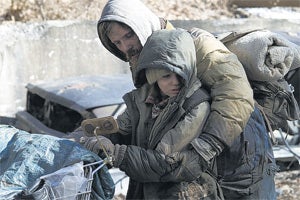
Try not to think about killing yourself during The Road, John Hillcoat's remorselessly grim adaptation of Cormac McCarthy's 2006 novel of the same name. The film runs just shy of two hours, though it feels a good deal longer. We are at the end of the world – again – and, unlike the spectacular meltdown in 2012, there's no masterplan to ship out the deserving few in giant rescue arks. In McCarthy's apocalyptic vision, humankind is on its very last legs, and there's nobody coming to save us. Actually, they're coming to eat us.
The set-up is as lean and austere as McCarthy's prose. America (for which read: the planet) has been devastated by an unspecified cataclysm, stripping it of vegetation and dooming most of its inhabitants. An ashen pallor hangs over the land, which groans with the noise of quakes and collapsing trees. Abandoned vehicles lie by the wayside, houses stand vacant and forlorn, bridges stretch emptily to nowhere. Through this blighted, blasted terrain two figures shuffle, a man and a boy, pushing a grocery trolley that contains all their worldly goods. They are travelling a road that leads south to the ocean, where there may be hope of safety. Or not.
The man (Viggo Mortensen) is haggard, ragged and bearded, and he surveys the world through eyes of animal quickness. He fears that the boy (Kodi Smit-McPhee), his 10-year-old son, might perish before he is old enough to protect himself. The boy, on the other hand, fears that his father's survival instincts will expunge what small store of humanity they have left to them. Both know that the road is a dangerous place to be: the few survivors of the apocalypse have been reduced to scavenging in packs, and worse. In one particularly gruesome passage, father and son stumble on what might be described as a human larder, and then come within an ace of ending up on the menu.
So there are moments of drama on this long and winding road, as well as an insistent moral tension. "Are we the good guys?" the boy asks, desperate for reassurance. Yes, the father tells him, though he keeps close a revolver with its two bullets in case he has to use it on them – better that than being savaged by cannibals. The alternation between predatory menace and aching footslog is reproduced faithfully from the novel by Hillcoat and his co-writer, Joe Penhall, who also furnish glimpses of a backstory. It transpires that the man had a wife (Charlize Theron), who took a more fatalistic view of their straitened circumstances, muffling the emotional impact of their final separation and suggesting, perhaps unwittingly, that Mortensen has rather more love for his son than he ever did for her.
Whatever the intention, The Road never manages to vary its lockstep movement. It pounds away at the idea of the man's love for his son – wears it like a badge of honour – to the extent that I eventually suspected it as a form of sentimental one-upmanship: the kid quaveringly calls his dad "pappa", and the dad hugs his son for dear life, protesting their tragic helplessness a little too keenly. One scene of profound paternal love would have been arresting; a hundred and one scenes of a father vowing to kill anyone who threatens his son gradually dwindle in force. It also becomes impossible to ignore the philosophical question posed by this dystopian horror: what exactly are they surviving for? When the climate is this severe, when food and shelter are this hard to come by, when your fellow man is this intent upon killing and eating you – when the whole world is this unmanageable – where does the will to live come from?
The usual complaint made of high-toned literary adaptations is that they miss the subtlety and rigour of the source novel. Not this time. Hillcoat and his production designer, Chris Kennedy, have done a bang-up job in translating McCarthy's images to the screen; the wintry atmosphere, the scarred landscape, the deserted stores and dwellings, everything is just as you envisaged it. Even the dark wit of the dialogue has made the transition. The boy asks his father: "We'd never eat somebody, would we?" "No – never." "Even if we were starving?" "We're starving now."
Yet such fidelity merely exposes the monotonous nature of the story, whose plodding one-thing-after-another movement is not as ennobling as the film-makers seem to believe. The heart craves a respite from the enshrouding gloom, and a small variation arrives, late on, in the shape of Robert Duvall, playing a tattered bit of human flotsam. Though apparently on the verge of expiring at any moment, Duvall enlivens the film for a scene or two with his odd twinkling stoicism.
All the acting, come to think of it, is exceptionally good. Mortensen has a fine record of playing oppressed heroes, and his air of exhausted but unbowed determination is poignantly convincing: if you had to choose someone as your last protector on earth, this might be your man. The young Smit-McPhee is also a strong presence, and a tribute to some casting director's shrewdness: his facial resemblance to Theron is remarkable.
Between them, they carry the movie – but what a dismal burden that is. The Road offers an allegory of misery and dread that is crushing, not because it denies humanistic feeling but because it defies cinemagoing pleasure. You would have to be mad – or just morbidly depressed – to recommend it to anyone.
Join our commenting forum
Join thought-provoking conversations, follow other Independent readers and see their replies
Comments